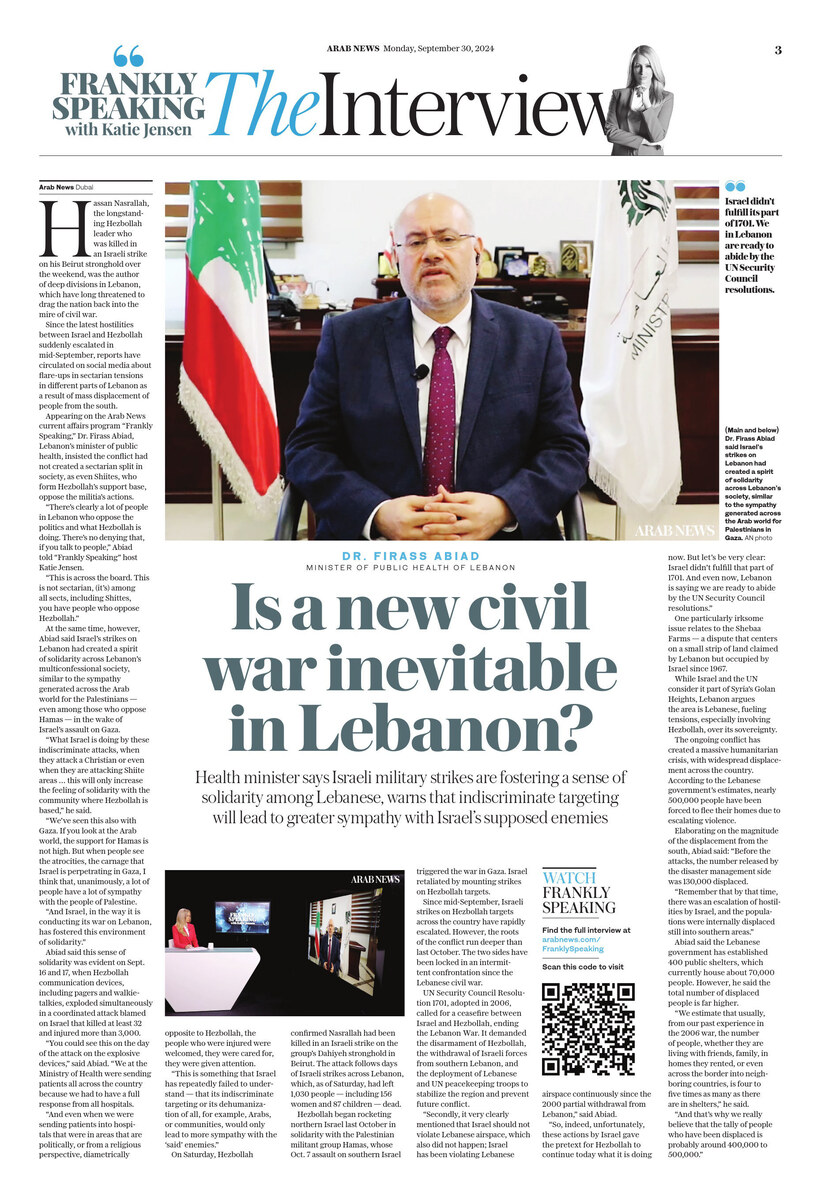DUBAI: Hassan Nasrallah, the longstanding Hezbollah leader who was killed in an Israeli strike on his Beirut stronghold over the weekend, was the author of deep divisions in Lebanon, which have long threatened to drag the nation back into the mire of civil war.
Since the latest hostilities between Israel and Hezbollah suddenly escalated in mid-September, reports have circulated on social media about flare-ups in sectarian tensions in different parts of Lebanon as a result of mass displacement of people from the south.
Appearing on the Arab News current affairs program “Frankly Speaking,” Firass Abiad, Lebanon’s minister of public health, insisted the conflict had not created a sectarian split in society, as even many Shiites, who form Hezbollah’s support base, now appear to oppose the militia’s actions.
“There’s clearly a lot of people in Lebanon who oppose the politics and what Hezbollah is doing. There’s no denying that, if you talk to people,” Abiad told “Frankly Speaking” host Katie Jensen.
“This is across the board. This is not sectarian, (it’s) among all sects, including Shittes, you have people who oppose Hezbollah.”
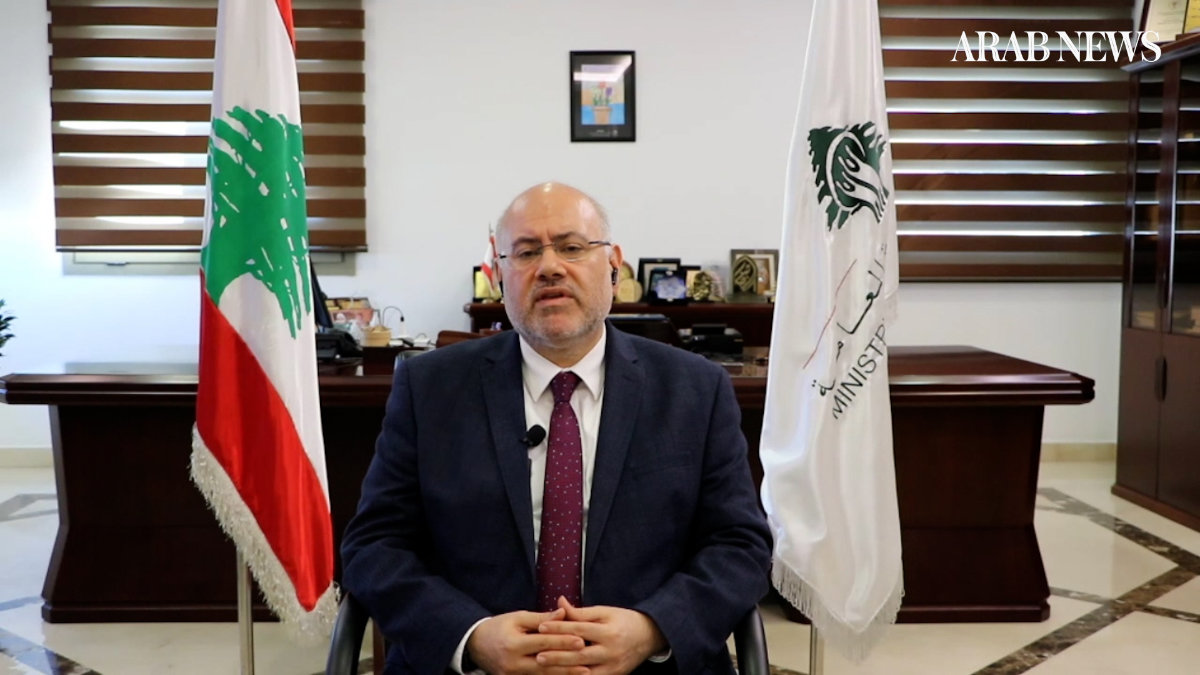
Dr. Firass Abiad, Lebanon’s minister of public health, insisted the conflict had not created a sectarian split, even as many Shiites appear to oppose Hezbollah’s actions. (AN photo)
At the same time, however, Abiad said Israel’s strikes on Lebanon had created a spirit of solidarity across Lebanon’s multiconfessional society, similar to the sympathy generated across the Arab world for the Palestinians — even among those who oppose Hamas — in the wake of Israel’s assault on Gaza.
“What Israel is doing by these indiscriminate attacks, when they attack a Christian or even when they are attacking Shiite areas … this will only increase the feeling of solidarity with the community where Hezbollah is based,” he said.
“We’ve seen this also with Gaza. If you look at the Arab world, the support for Hamas is not high. But when people see the atrocities, the carnage that Israel is perpetrating in Gaza, I think that, unanimously, a lot of people have a lot of sympathy with the people of Palestine.
“And Israel, in the way it is conducting its war on Lebanon, has fostered this environment of solidarity.”
Abiad said this sense of solidarity was evident on Sept. 16 and 17, when Hezbollah communication devices, including pagers and walkie-talkies, exploded simultaneously in a coordinated attack blamed on Israel that killed at least 32 and injured more than 3,000.
“You could see this on the day of the attack on the explosive devices,” said Abiad. “We at the Ministry of Health were sending patients all across the country because we had to have a full response from all hospitals.
“And even when we were sending patients into hospitals that were in areas that are politically, or from a religious perspective, diametrically opposite to Hezbollah, the people who were injured were welcomed, they were cared for, they were given attention.
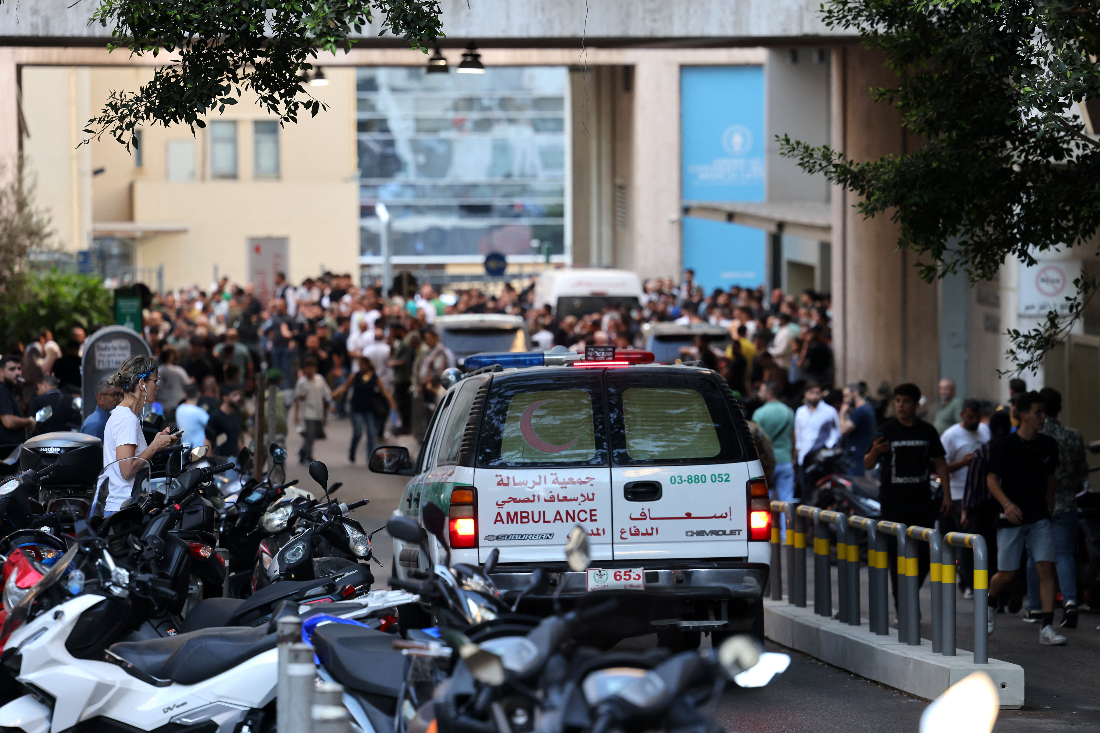
An ambulance brings injured Lebanese to the AUB Medical Center, on Sept. 17 after beeper blasts targeted Hezbollah operatives. (File/AFP)
“This is something that Israel has repeatedly failed to understand; that its indiscriminate targeting or its dehumanization of all, for example, Arabs, or communities, would only lead to more sympathy with the ‘said’ enemies.”
On Saturday, Hezbollah confirmed Nasrallah had been killed in an Israeli strike on the group’s Dahiyeh stronghold in Beirut. The attack follows days of Israeli strikes across Lebanon, which, as of Saturday, had left 1,030 people — including 156 women and 87 children — dead.
Hezbollah began rocketing northern Israel last October in solidarity with the Palestinian militant group Hamas, whose Oct. 7 assault on southern Israel triggered the war in Gaza. Israel retaliated by mounting strikes on Hezbollah targets.
Since mid-September, Israeli strikes on Hezbollah targets across the country have rapidly escalated. However, the roots of the conflict run deeper than last October. The two sides have been locked in an intermittent confrontation since the Lebanese civil war.
Hezbollah was formed during Israel’s 1982 invasion of Lebanon. Major escalations occurred in 1993, 1996, and particularly in 2006, when a full-scale war erupted, causing significant destruction in Lebanon.
Hezbollah has since strengthened its military capabilities, while maintaining its role in Lebanese politics. Tensions continued, with periodic border clashes, as the group has evolved into a key player in the broader Israel-Iran proxy conflict.
Israel withdrew its troops from Lebanon in 2000, creating the possibility of stability for Lebanon. However, territorial disputes remained, which Hezbollah exploited to build support and to justify continued resistance to Israel.
Does a share of the blame for the continuation of hostilities, therefore, belong to Hezbollah?
“No, that’s the exact opposite,” said Abiad. “If you go back to the UN resolutions — especially 1701. In 1701, it was very clear that, first of all, Israel has to withdraw from all the areas in Lebanon, which did not happen. And up till now, Israel still occupies Lebanese territory.”
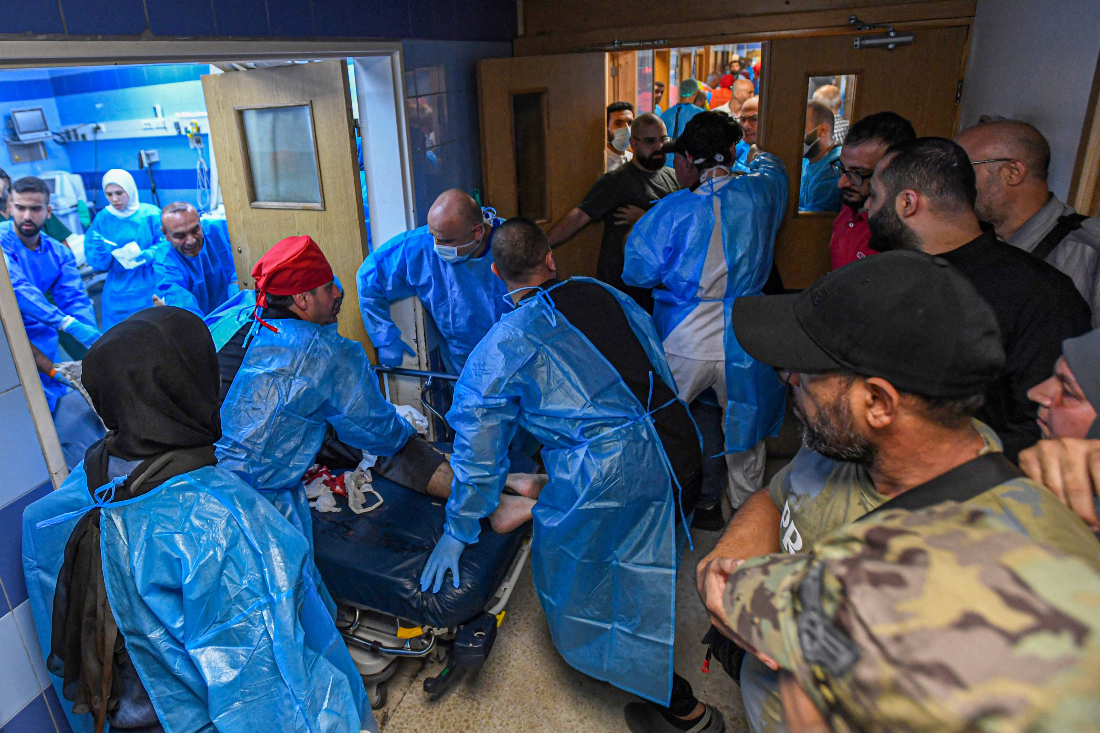
Medical staff at a hospital care for victims after the Israeli military struck Hezbollah targets in Beirut's southern suburb last week. (File/AFP)
UN Security Council Resolution 1701, adopted in 2006, called for a ceasefire between Israel and Hezbollah, ending the Lebanon War. It demanded the disarmament of Hezbollah, the withdrawal of Israeli forces from southern Lebanon, and the deployment of Lebanese and UN peacekeeping troops to stabilize the region and prevent future conflict.
“Secondly, it very clearly mentioned that Israel should not violate Lebanese airspace, which also did not happen; Israel has been violating Lebanese airspace continuously since the 2000 partial withdrawal from Lebanon,” said Abiad.
“So, indeed, unfortunately, these actions by Israel gave the pretext for Hezbollah to continue today what it is doing now. But let’s be very clear, Israel didn’t fulfill that part of 1701. And even now, Lebanon is saying we are ready to abide by the UN Security Council resolutions.”
One particularly irksome issue relates to the Shebaa Farms — a dispute that centers on a small strip of land claimed by Lebanon but occupied by Israel since 1967.
While Israel and the UN consider it part of Syria’s Golan Heights, Lebanon argues the area is Lebanese, fueling tensions, especially involving Hezbollah, over its sovereignty.
Given what is now occurring in Lebanon, does Abiad believe continuing the Shebaa Farms dispute with Israel has been worthwhile? Surely a negotiated deal would have been a far better option?
“But that depends on the other party accepting a negotiation,” said Abiad. “And, up to now, it has been very clear that Israel is not interested in a negotiated outcome.”
Whoever is ultimately to blame for prolonging the conflict, the result today is mass displacement, civilians killed, thousands injured, and public health system under extreme strain.
The ongoing conflict has created a massive humanitarian crisis, with widespread displacement across the country. According to the Lebanese government’s estimates, nearly 500,000 people have been forced to flee their homes due to escalating violence.
Abiad highlighted the magnitude of the displacement from the south. “Before the attacks, the number released by the disaster management side was 130,000 displaced,” he said.
“Remember that by that time, there was an escalation of hostilities by Israel, and the populations were internally displaced still into southern areas.”
Abiad said the Lebanese government has established 400 public shelters, which currently house about 70,000 people. However, he said the total number of displaced people is far higher.
“We estimate that usually, from our past experience in the 2006 war, the number of people, whether they are living with friends, family, in homes they rented, or even across the border into neighboring countries, is four to five times as many as there are in shelters,” he said.
“And that’s why we really believe that the tally of people who have been displaced is probably around 400,000 to 500,000.”
The pressure on hospitals, in particular, is reaching breaking point.
“The daily tally of casualties keeps rising, as hospitals get overwhelmed with casualties,” said Abiad. “Can we continue all this? The answer is we are working at nearly full capacity, I would say. And it is becoming more tough as the war drags on.”
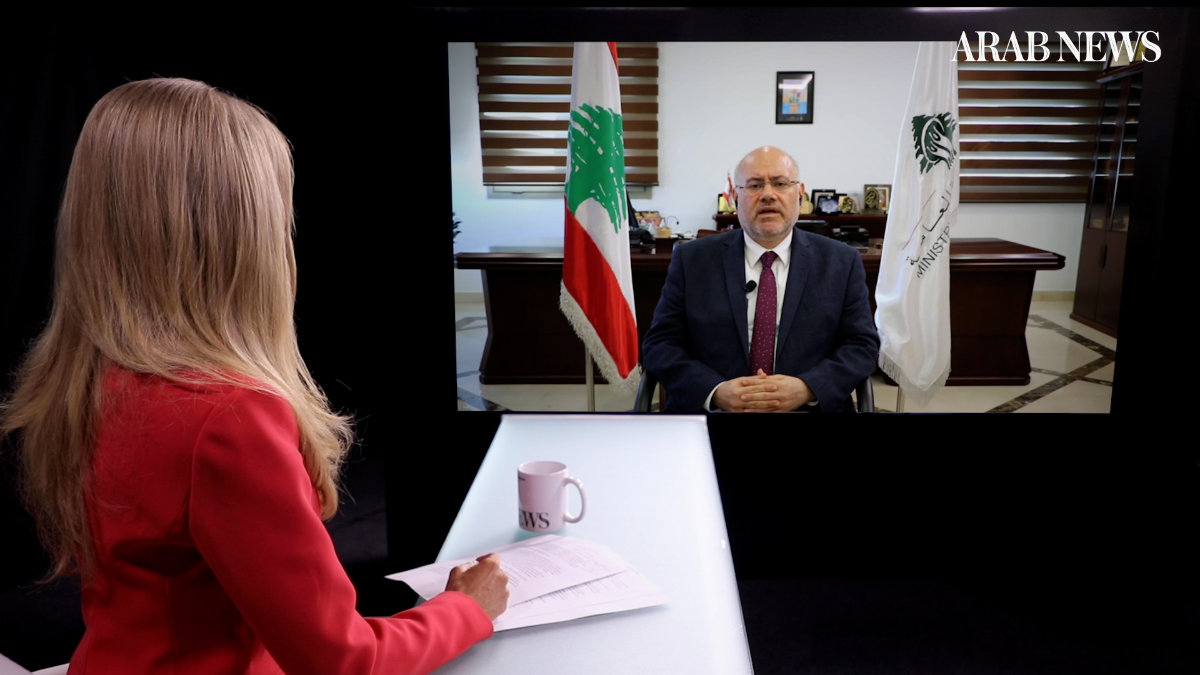
“There’s clearly a lot of people in Lebanon who oppose ... what Hezbollah is doing. There’s no denying that, if you talk to people,” Dr. Firass Abiad told “Frankly Speaking” host Katie Jensen. (AN photo)
He added: “I think the most challenging would be fuel. I think that, concerning nurses, hospital beds, medical supplies, medications, as I said, we have been stocking up on our inventory. But really, fuel is going to be a critical issue.
“Hospitals, ambulances, they all require fuel to function. Now we have been increasing the renewable-energy budgets in our hospitals — 15 of our public hospitals now have renewable energy, constituting almost 40 percent of their energy requirements.
“Almost 200 of our primary health care centers now completely can work or function on renewable energy. But clearly I would say fuel is going to be critical if there is a further escalation.”
On top of this, Abiad accused Israel of deliberately targeting medical personnel — something he says constitutes a war crime.
“Do we consider this a war crime? Of course, we consider this a war crime,” said Abiad, adding that this was not just the view of the Lebanese government but echoed by international legal bodies.
“When we listen to the International Court of Justice, these are the experts on what is international humanitarian law and whether it has been violated. So these are the experts telling us that what Israel is doing constitutes war crimes.”
